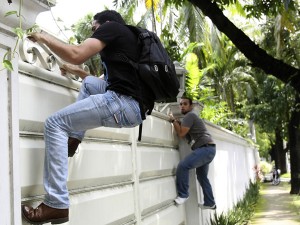Libyans say Manila diplomat quits

Libyan nationals climb on a gate of the Libyan Embassy in Makati City Thursday. The two enraged Libyan students barged into their embassy to try to evict diplomats they suspect remain loyal to former dictator Moammar Gadhafi. AP
MANILA, Philippines—One of two Libyan activists who stormed their embassy in Makati City said a diplomat they accused of backing ousted dictator Moammar Gadhafi has agreed to resign.
Associated Press journalists saw the two activists scaling the embassy’s walls and barging into the building Thursday afternoon after scuffling with Filipino guards.
One of the intruders, former student Elyosa Fathi Elgardag, told the AP late Thursday that they left the embassy after the Libyan staff showed them a senior diplomat’s resignation letter.
The other diplomat the two activists were seeking to oust from the embassy told them he wasn’t a Gadhafi loyalist, according to Elgardag.
The diplomat wasn’t identified, and the Libyan Embassy staff refused to comment. The Philippine Department of Foreign Affairs also did not comment Friday.
Elgardag said they were satisfied with the development.
“We are happy with that,” he said, adding that they left the building in an embassy car without further incident.
Several other Libyan activists, most of them studying in the Philippines, were barred Thursday from accompanying their two friends who entered the upscale gated community in Makati’s financial district, where the embassy is located. A crowd-control team stood by in case the Libyan protesters approached the embassy.
Last month, Libyan diplomats in Manila raised the flag of the interim rebel government, the National Transitional Council, as Tripoli’s diplomatic missions across the world defected from Gadhafi, underscoring his rapid fall after nearly 42 years in power.
The ecstatic, young Libyans rampaged through the embassy compound in August, smashing Gadhafi’s glass-covered portraits, shouting “Die Gadhafi, die!” and ripping his “Green Book,” which contains his ruling philosophy.
But Elgardag said the Libyan diplomats in Manila were under pressure to switch sides after he and other Libyans based in the Philippines forced them to defect.
Elgardag’s companion, a student who did not give his name, said the embassy failed to arrange for the continuation of financial aid to Libyan students abroad, making their lives miserable. He said they were barred from entering the embassy and were left with no choice but to storm it.
Elgardag said that despite Gadhafi’s ouster, the Libyan people should remain vigilant and ensure that succeeding leaders stomp out problems like massive corruption.
“It’s not yet over,” he said, adding that the Libyan revolt should “move all the corruption from the country. It’s not just to move the president.”
The Philippines in August recognized the opposition-led interim government in Libya after initial reluctance over concerns for safety of 1,700 Filipino workers, mostly nurses, still in the country.
Gadhafi used to bankroll Muslim rebels in the southern Philippines but later brokered a historic 1976 peace accord between the main Muslim group and the Philippine government.
Libya also reportedly paid millions of dollars in ransom for the release of Western hostages held by the al-Qaida-linked Abu Sayyaf group in 2000.